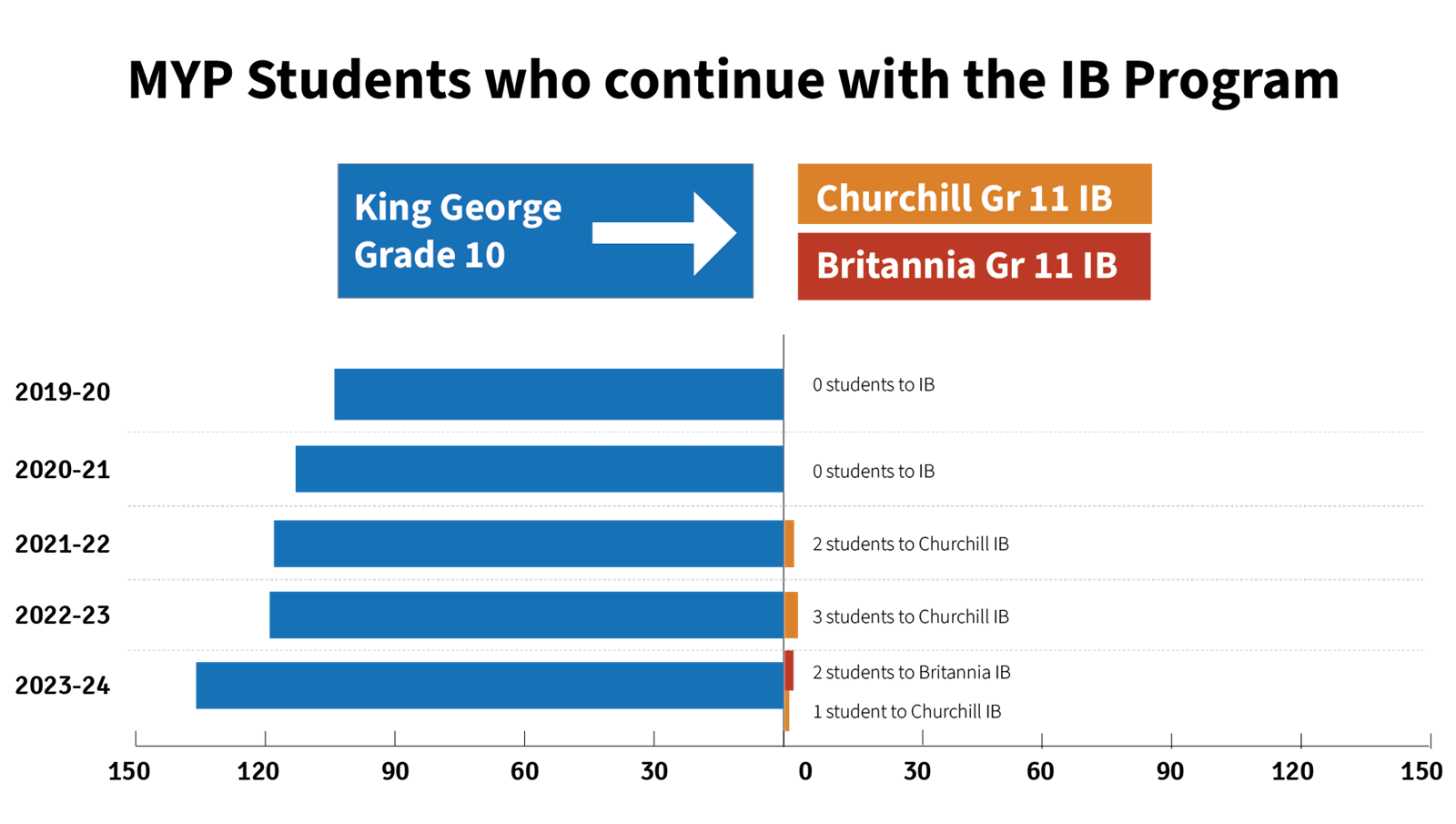Frequently Asked Questions
The following common questions emerged during the engagement process.
PROCESS
Q: Why does the Board have to make a decision about the future of MYP so quickly?
A Board decision about the future of MYP is required by December 1, 2024. There are three reasons for this.
- To ensure families and students maintain the opportunity to participate in the cross-boundary and mini-school application process in December and January.
- This timeline ensures minimal scheduling, staffing and budget disruptions.
- The Board needs to decide the future of MYP by December 1, 2024, as IB World mandated that the District begin implementing the recommendations outlined in its evaluation report by this date to retain its IB accreditation. For the Board to decide by December 1, 2024, this engagement report must be presented at the November 25, 2024, public Board meeting.
It is important to note the 2024 IB evaluation report was shared with VSB in the summer of 2024 and mandated implementation of the recommendations begin by December 1, 2024. Recognizing the summer break and the focus on back-to-school in September, the earliest the District could begin engaging with impacted community members was in October.
The following timeline was established to structure the engagement process with impacted community members, ensuring their feedback helps inform the Board’s decision.

Q: MYP has not been in compliance since the Spring 2018 evaluation report. Why did it take so long for the District to address this?
Addressing the recommendations from the 2018 evaluation report faced several challenges. Although the initial deadline for implementation was in 2019, the schools that offered MYP faced significant recruitment and retention challenges with staff (particularly the IB coordinator position). Coupled with significant staff turnover, the implementation of the recommendations was delayed. While the schools requested and were granted an extension to meet the requirements, the onset of the COVID-19 pandemic shifted the District’s priorities toward addressing immediate and emerging safety needs within schools. After the pandemic subsided in 2022, MYP schools continued to face staffing challenges, further delaying progress in implementing the recommendations.
The 2024 IB evaluation report was shared with VSB in the summer of 2024 and mandated implementation of the recommendations begin by December 1, 2024.
PROGRAM QUESTIONS
Q: Is MYP a prerequisite for entrance into the IB Diploma Programme (DP) for grades 11 and 12?
No, MYP is not a prerequisite for DP or any other district programs, including secondary mini schools. IB Programs are independent. Students do not have to complete PYP before MYP or complete MYP to apply to DP.
For DP, students are required to undergo an application process for entrance into DP at Britannia Secondary or Churchill Secondary, which are District Choice programs.
Q: How many MYP students applied to DP and how many were accepted into the program?
Most Grade 10 MYP students are not choosing to continue IB in the Diploma Programme in Grade 11-12. Data shows students choose to remain at their catchment school, King George Secondary. It is important to note, students who apply in DP are offered a spot in the program.

Q: What are the current literacy and numeracy achievement levels in schools offering the MYP program, when compared to other schools in the District?
Student learning and achievement remain a top priority for the Vancouver School Board. For the 2023-2024 school year, 54.9 per cent of Grade 10 students at King George achieved proficient or extending levels on the Numeracy 10 assessment, slightly below the district average of 60.7 per cent. On the Literacy 10 assessment, 74.7 per cent of King George Grade 10 students achieved proficient or extending levels, closely aligning with the district average of 76.7 per cent.
At the Grade 7 level, 73.6 per cent of students at Roberts and 70.6 per cent of students at Elsie Roy achieved proficient or extending levels in math, both exceeding the district average of 70.4 per cent. In English, 70.1 per cent of Roberts students and 68.6 per cent of Elsie Roy students achieved proficient or extending, compared to the district average of 64.1 per cent.
It is important to note that while these numbers provide insight into academic achievement, the District does not rank schools or support external ranking systems, such as those published by the Fraser Institute. These rankings are not vetted by the Vancouver School Board and do not reflect the diverse, holistic approaches we take to support student learning and success.
Q: Community service hours is a component valued by MYP families and an integral part of the IB program. What would be its replacement in the BC curriculum if the MYP was discontinued?
Educators already incorporate community service activities at all grade levels as part of the BC curriculum, specifically as part of the Personal and Social core competency. However, it is documented differently than IB program requirements.
Activities vary from school to school and can include volunteering in the school community to support initiatives and projects like special school events, being a recess buddy for a younger student, leading school assemblies, being a lunch monitor, and supporting school wide climate action projects. Additionally, the Career Life Connections (CLC) course, a requirement for all students, expects students to complete 30 or more hours of community service as part of graduation requirements, ensuring that community engagement remains an integral part of their educational experience.
Q: If MYP is discontinued, what will happen to PYP or DP?
PYP and DP are in compliance with IB World requirements and as such, will continue to be offered to students.
TEACHING AND LEARNING
Q: How many teaching resources are currently dedicated to MYP, and what is the anticipated plan for these staff members if the program discontinues?
Currently, the only teaching resource specifically dedicated to the MYP program is the MYP coordinator role. This part-time position primarily supports teachers by assisting with curriculum implementation, program administration, and ensuring compliance with IB-specific requirements. The role does not involve direct engagement with students.
Staffing allocations follow the terms and conditions outlined in the collective agreement.
At King George Secondary, the MYP coordinator role is allocated three blocks of support time out of the eight-block timetable. This role is currently shared by three teachers. If these blocks were no longer required, the teachers would instead take on additional enrolling, teaching classes, meaning these educators would be teaching students directly. At Lord Roberts and Elsie Roy elementary schools, the MYP coordinator is allocated one day per week for IB administrative tasks. If the program discontinues, these coordinator allocations would be reabsorbed into general teaching responsibilities, aligning with the schools’ instructional needs.
Q: How will student learning outcomes be impacted if they no longer have access to MYP resources?
If MYP was discontinued, students will continue learning using the BC curriculum. Given the significant overlaps between the two curricula, learning outcomes will not be impacted and students will not notice a difference in their day-to-day learning experience. MYP resources are mainly directed to the IB Coordinator position, which focuses on supporting teachers rather than directly interacting with students. The IB Coordinator assists educators with administrative tasks such as curriculum planning, managing program requirements, ensuring compliance with IB standards, and providing professional development opportunities. Their primary responsibility is guiding and assisting teachers in delivering the IB curriculum within its framework, rather than working directly with students.
Q: What types of training will be available for teachers if they are no longer IB certified?
Teachers will continue to have robust learning and training opportunities to support their work with the BC Curriculum if IB training is no longer required.
All VSB teachers have access to professional development funds for ongoing professional growth and learning and this is supported by the scheduling of six professional development days yearly. In addition, District teams, including the Learning and Instruction team and the Learning Services team offer many professional learning opportunities for all VSB educators. This can include, but is not limited to, workshops, mentorship, learning bursts, as well as co-planning and co-teaching possibilities in classrooms. The District also provides curated resources for teaching and learning on the internal VSB intranet.
Q: If the MYP program continues, how much teacher training is required?
MYP training is dependent on workshop availability and is offered both locally and internationally. In-person workshops are typically three full days, and online workshops are completed over four weeks. Teachers will require release time (TTOC) coverage to attend both in-person and online training. It may take up to a year for all teachers to be trained, based on the availability of sessions and the individual schedules of teachers.
Q: How often do IB teachers need to complete training?
IB World recommends teachers are trained every five years and every time the organization goes through a curriculum change.
The next curriculum change is expected to launch in 2026, meaning all educators teaching the MYP program will need to be retrained, regardless if prior training took place in less than five years. The District expects to invest $441,489 to $538,744 in training fees for that particular year. More information can be found under financial implications.
Q: How much does training cost on average per teacher?
The cost of training is $1,000 to $5,000 per teacher (depending if the IB workshops are held locally, out of province or virtually) and must be renewed on a five-year cycle or if there is a curriculum update. Curriculum resources, assessment fees and facility upgrades, can further increase the costs. More information can be found under staff training.

